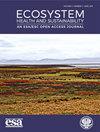黑河流域社会发展对生态系统服务演化的影响
IF 3.4
2区 环境科学与生态学
Q1 ECOLOGY
引用次数: 0
摘要
在过去的数千年里,通过土地和水资源利用的变化,人类活动增加了生态系统服务的提供,但减少了一些调节、支持和文化服务。土地和水的使用对不同类型生态系统的影响已经得到了广泛的研究,但它并没有与其社会驱动因素直接联系起来,因此未能解释生态系统退化的社会根源。本文旨在考察2000年以来,社会价值、制度治理和科学技术发展三个一般社会驱动因素对黑河流域生态系统演变的影响。供水、粮食供应、地下水维护、气候调节和环境流量维护被视为主要的生态系统。采用内容分析方法,从不同的文本文献中追踪3种社会驱动因素的变化。研究发现,中游的粮食供应和地下水维护与下游的环境流量维护服务之间存在着强烈的权衡关系。缓慢变化和独立发展的社会驱动因素未能适应日益增长的粮食供应需求,同时解决地下水和环境流量的大幅减少问题。结论是,合理的水(再)分配和使用是不同类型生态系统平衡发展的先决条件,而将社会发展与人类从生态系统中获得的利益联系起来是可持续生态系统管理的先决前提。本文章由计算机程序翻译,如有差异,请以英文原文为准。
Impacts of Societal Development on the Evolution of Ecosystem Services in the Heihe River Basin, China
Human activities through changes in land and water use have led to increase in provision ecosystem services (ESs) but decrease in some regulating, supporting, and cultural services in the past thousands of years. The impact of land and water use on different types of ESs has been extensively studied, but it has not been directly linked to its societal drivers, thus failed to explain the societal root cause of ES degradation. This paper aims to examine the impacts of 3 generic societal drivers: societal value, institutional governance, and science and technology development on the evolution of ESs in the Heihe River Basin, China since 2000 years ago. Water provision, food provision, groundwater maintenance, climate regulation, and environmental flow maintenance were examined as the major ESs. Content analysis method was used to track the change of the 3 societal drivers from various textual documents. It was found that there were strong trade-off relationships between food provision and groundwater maintenance in midstream and the environmental flow maintenance services in downstream. The slow-changing and independently developed societal drivers failed to adaptively respond to the increasing food provision demands while addressing the significant decrease in groundwater and environmental flows. It is concluded that rational water (re)allocation and use are the prerequisites of balanced development of different categories of ESs and linking societal development to the benefits humans obtain from ecosystems is the prerequisite for sustainable ES management.
求助全文
通过发布文献求助,成功后即可免费获取论文全文。
去求助
来源期刊

Ecosystem Health and Sustainability
Environmental Science-Management, Monitoring, Policy and Law
CiteScore
7.10
自引率
2.00%
发文量
40
审稿时长
22 weeks
期刊介绍:
Ecosystem Health and Sustainability publishes articles on advances in ecology and sustainability science, how global environmental change affects ecosystem health, how changes in human activities affect ecosystem conditions, and system-based approaches for applying ecological science in decision-making to promote sustainable development. Papers focus on applying ecological theory, principles, and concepts to support sustainable development, especially in regions undergoing rapid environmental change. Papers on multi-scale, integrative, and interdisciplinary studies, and on international collaborations between scientists from industrialized and industrializing countries are especially welcome.
Suitable topics for EHS include:
• Global, regional and local studies of international significance
• Impact of global or regional environmental change on natural ecosystems
• Interdisciplinary research involving integration of natural, social, and behavioral sciences
• Science and policy that promote the use of ecological sciences in decision making
• Novel or multidisciplinary approaches for solving complex ecological problems
• Multi-scale and long-term observations of ecosystem evolution
• Development of novel systems approaches or modeling and simulation techniques
• Rapid responses to emerging ecological issues.
 求助内容:
求助内容: 应助结果提醒方式:
应助结果提醒方式:


